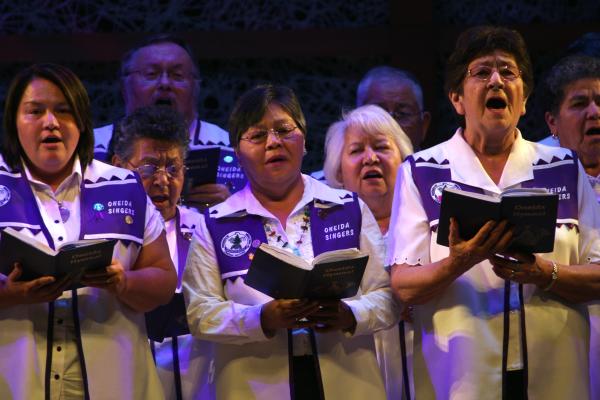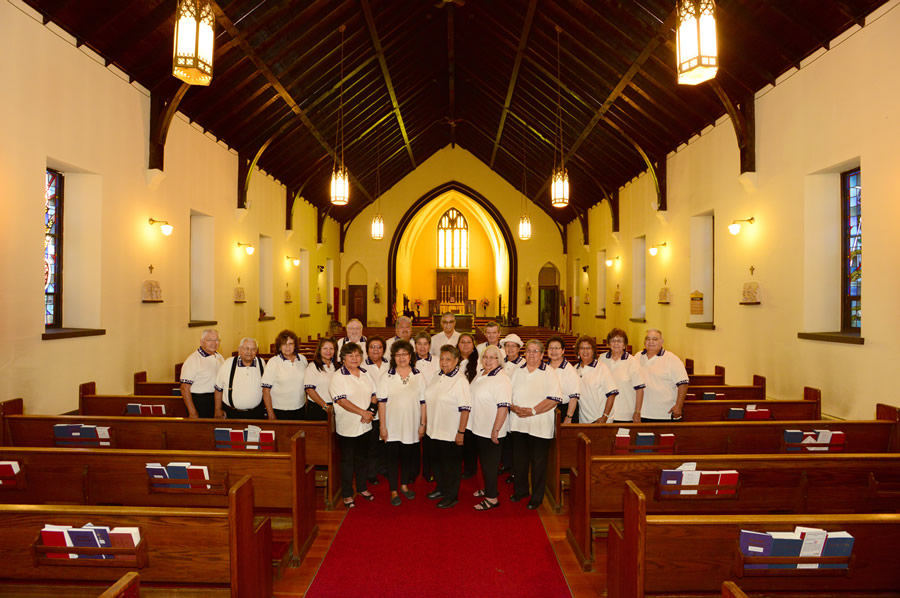Oneida Hymn Singers of Wisconsin

Photo by Michael G. Stewart
Bio
The Oneida people began to populate the Oneida Reservation, near Green Bay, Wisconsin, in 1822, following treaties with the Menominee Nation. As early as the mid-1600s, missionaries from the Episcopal Church of England had visited the Iroquoian homelands of the Oneida in New York state. Society of Friends visitors to the Oneida noted the quality of their singing as early as 1795. By 1835, there was a Christian hymnal written in Mohawk, a related language, intended for a capella singing. The Oneida Singers of Wisconsin have maintained this beautiful singing tradition for nearly 90 years. The informal group of singers, ranging in number from less than a dozen to more than fifty and in age from young teens to older than eighty, sing at funerals, tribal ceremonies, and on social occasions. In 2004, the Oneida Singers were selected to perform at the opening of the National Museum of the American Indian in Washington, DC. Their performance is featured on a Smithsonian Folkways Recording titled The Beautiful Beyond. In the notes for this recording, Gerald Hill says that the use of Native languages to sing the hymns "helps sustain the traditional values of Indian communities through a means of religious expression that is understood and accepted by present generations even as it honors the past."

The Oneida Hymn Singers. Photo by Linda R. Martin (Navajo)/National Museum of the American Indian. © 2001.
Interview by Mary Eckstein for the NEA
[Editor's note: Gordon McLester is a member of the Oneida Hymn Singers of Wisconsin and an award-winning author and historian. ]
NEA: Congratualtions to the Oneida Singers for receiving the National Heritage Fellowship. Were you surprised about the award?
Gordon McLester: Yes. It had been quite some time since we were nominated and most of us pretty much forgot about it. So when it came through we were really surprised.
NEA: What's been the reaction in the larger community? Is it being talked about?
Gordon McLester: Everybody is congratulating the singers and they feel it's quite an honor. I don't really think it's set in totally, you know? The majority of the people, including myself, probably don't really understand and realize the significance of it at this point. That may not come about until we actually get down there.
NEA: Who makes up the Oneida Singers? Are there many young people?
Gordon McLester: Actually, it's usually the older people that participate. Very seldom do you get anybody in their teens or 20s to become involved. They just seem to have a whole lot of other things to do, which is normal. It's the same thing with the singing and dancing at the powwows. They pick it up at an early age and then when they get to be teenagers, they leave it aside. Then they pick it up at a later time. I think the singing is along the same lines. You listen to your grandparents and your elders sing when you're young but when you are a teen and young adult things become pretty fast and hectic in your way of life. But as you get a little bit older, you begin to realize there's more to this whole thing than just getting out and about. You begin to set a different pace, have a different outlook on life and what it's all about. That's when a lot of people want to become involved again and they start coming back in when they're in their 40s, 50s, and so on.
NEA: Can you talk a little bit about how the group works in terms of decision making? I understand there's an emphasis on consensus-building.
Gordon McLester: That would be the best way to put it, yes. Carol Cornelius is who I guess you would call our leader. She's primarily the one that takes all the inquiries for where we should go to sing or from people inviting us here or there. She disseminates that information to the group and whoever can make it shows up. We never know how many are going to show up at any given time. Once everybody comes together, she has an index of songs that we go through. We probably practice maybe once or twice a month on a regular basis and we sing sometimes two or three times a week at wakes or other activities. Again, at any given event, the group is whoever has time and wants to show up.
Everybody and anybody from the tribe is welcome to join. It doesn't matter what denomination you are or what background. Even if you can't sing, you're still welcome.
NEA: What is it you think the Singers give to people, such as someone who's just lost a family member?
Gordon McLester: I think it's really the warmth, the knowing that somebody cares. There's a story about death that talks about the people with clear minds and the ones whose minds are foggy because they're in mourning. So what you do is you have people that have the clear minds come in and help with the meals, all the preparations for the funeral, and so forth, and that is part of what I think the singing is about. It helps the people that have the cloudy minds during their time of grief and it helps to calm them. It helps clear their minds, it helps them prepare to to go through the necessary things that are done during their time of grief. I think that's the most significant thing about the singers and what affect they have on people.
NEA: You've been referred to as ambassadors of the Oneida. Can you talk about the importance of the group in terms of communicating with a broader public about you and about your culture?
Gordon McLester: I think that would be a good term to use. We are ambassadors for the tribe from the standpoint of the singing part of the traditions. Some members of the group have had the opportunity to travel throughout the United States and Canada and there are members that have gone on tour to France, Germany, Finland, and other countries numerous times over the past 20 years. Each time that you go, you're a member of the group but you're also representing the Oneida Nation. I think that's something that's instilled in everyone at a very early age and carried by everybody that participates.
NEA: Generally, the Heritage Fellowships are given to individuals, but in your case it's being shared by a group. Since the tradition that dates back hundreds of years, in a way you're sharing it with the people who've gone before you and created this tradition.
Gordon McLester: The time has come for the recognition of not just of singers of today but the singers from time immemorial up to the present. That just adds to the honor being bestowed on the present day singers because this carries back to the beginning of the stories that they tell about the singers. All of those people that were involved represented the Oneida Nation in their time and we just happen to be fortunate enough to carry that honor for all of those that have gone past and all of those that will be coming in the future.
NEA: Has the music has changed over time?
Gordon McLester: We do have some recordings that were made back in the '30s and '40s and I just happened to run across some of those in the Library of Congress. It was the first time that I had heard them. Listening to those songs, and the ones we sing today, the melodies are pretty much the same. There's not a real heavy change, just a small emphasis in terms of the pitch or the women singing certain choruses as opposed to the men. They're very subtle changes. I feel that what we're singing now, we could sing with a group from 100 years ago. As a matter of fact, there are some groups of Oneidas that live in Canada and we come together maybe once every four or five years. They sing it a little bit differently but we can all join in together and sing. So, yes, there've been subtle changes, but you'd have to be a singer to recognize them.
NEA: Do you or the other group members worry about the hymn singing tradition continuing?
Gordon McLester: We think about that every day. It's along the same lines as our language. Our language is on the verge of going the way of the dinosaur and almost all the Native American nations are losing their language. The kids are just not picking it up any more and, unfortunately, it's the same with the singing. We're constantly worrying about that and we try to make efforts and inroads to younger people to come in and learn these songs. But it's not good, it's diminishing all the time. Our groups are smaller than they used to be, there are not so many people that sing. There might have been about six, eight different groups that sang on a reservation at one time. Now there's probably one, two, maybe three groups at the most and the vast majority of those people are 50 or above. On a regular basis, we've probably got about four of them that are in their 40s and 50s and it doesn't look good for the future. But we can't stop trying to solicit people to come in and sing.
NEA: If someone who's young and really interested, comes in and wants to learn, what guidance do you give?
Gordon McLester: Unfortunately, the way it's done now, you just come in and you sit there and try to pick up the songs as best you can. It seems like it's always been that way -- you don't ask to come in, you just come in and they almost don't even notice you. I don't know if that's by design but they let you just come in and learn at your own pace. We don't really seem to organize, with the exception of having practices, and those are advertised in our tribal newspaper and anyone's welcome. But when you do come in there's no real orientation. There's an introduction that so and so is here and wants to start to learn. Then the singers just kind of wait and see whether you're really going to stay with it. If you do, then you become a singer.
NEA: What motivates you and the group to just continue singing and continue these traditions that are so important to the community?
The reaction of the people we were singing for -- you're singing for them, not for yourself. We have a responsibility to help them in their time of need and that has become stronger over the 30 years I've been singing. it doesn't diminish at all. I'm just hoping that my children or my grandchildren will begin to maybe feel the same way at some point.

